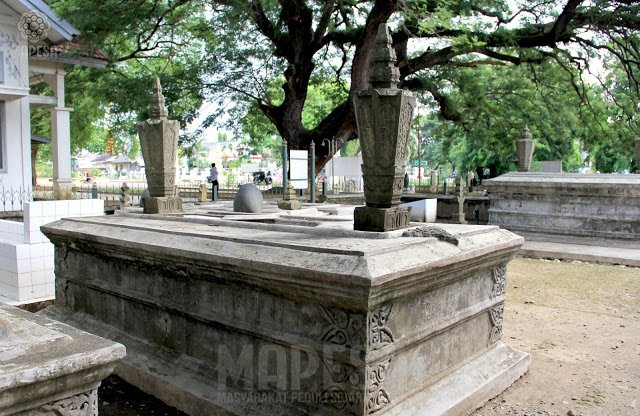Sufi Poetry in the Defenders' Coffin
His name appears strong in events through the middle of the 19th century AD (the 13th hijri). At that time, the Netherlands is working hard to plant its influence in East Sumatra through cunning roads. And he was then the commander of the armed forces of Aceh Darussalam.
His name, as he is inscribed on his gravestone grave, is Tuanku Pangiran Husain. He is the son of the advocate of the Islamic homeland, the deceased Paduka Sri Sultan Manshur Syah Zhillu-Llah fil 'Alam, Sultan Aceh Darussalam.
The motion of Tuanku Pangiran Husain, on the orders of his father, to the region of East Sumatra in 1854, immediately alarmed the Dutch. With a fleet of 200 warships, he has successfully completed his task, in a short time, bringing together forces in East Sumatra to confront the Netherlands.
"Some of the confessions have been reached, the contents of which are the sovereignty of Aceh are indeed those areas, Aceh titles to Tengku Ngah Langkat who so far held the title of Prince Mangku Negara Raja Muda Langkat became Prince Indra Diraja Amir The Sultan Usman Deli was granted the power of the Sultan of Aceh to be the representative Sultan Basaru'ddin Serdang mandated the title of Vizir Sultan of Aceh, "as stated by M. Said in his book, Aceh Throughout the Ages (I: 550; 618-620).
The declaration of the late Master Hussein Pangiran Husain in those critical times, as well as the success of his work, shows this personal greatness, which has always faithfully stood with his Father for the lofty ideals of defending the Islamic homeland. However, it seems that the destiny of the Most High did not give him a longer time to be with his Father in reaching those ideals.
A date on his grave's grave, though not expressly stated as the date of his death, but it is understandable that on his date, he goes to Rahmatu-Llah 'Azza wa Jalla. Editor of the calendar: "And in 1281 in the month of Shafar."
On one of his grave stones in the Baperis Kandang complex, Banda Aceh, today, there are 8 panels of inscription. Two panes of which contain epitaphs, and the rest are poems written by Shaykh Ibrahim At-Taziy.
Shaykh Ibrahim bin Muhammad bin 'Ali is a pious, literary and Sufi-born Taz (Tazah), Morocco, around the beginning of the 9th century hijri (15th), and after a long time in Haramain, he later settled on Oran (Wuhran ), Algeria, and died there on 9 Sha'ban 866 hijri (1462 AD).
It is difficult to trace how the poetry verses of Shaykh Ibrahim At-Taziy can be sculpted on the grave of the Tomb of the late Tuanku Pangiran Husain. For, even today, the verses of the poem are only new to be found in "Tsabat Abi Ja'far Ahmad bin 'Ali Al-Balwi Al-Wadi Asyi", who died in 933 hijri (1532 AD) - unless indeed is contained in a collection of wirid-wirid or prayers that partially prescribed tariqat shufiyyah or written in articles related to tasauf that we have not known. But one thing that can be ascertained from it all is the fact that Aceh Darussalam is indeed one of the most famous centers of Islamic science and culture in the world before its declining period to this day.
Some verses of the poem of Shaykh Ibrahim At-Taziy found on the headstone of Tuanku Pangiran Husain are among the verses in the tenth Qasidah contained in "Tsabat". The poems contain the meanings of flattery and love to Rasulullah Shalla-Llahu 'alaihi wa Sallam. The four stanzas of poetry on the tombstone contain the wishes of the Messenger of Allaah (peace and blessings of Allaah be upon him), the intercessor in the future.
Thus inscription is inscribed on gravestone grave of the late Tuanku Pangiran Husain bin Sultan Manshur Shah - may Allah forgive and bless both with his wide grace, and placed both in His heaven, Jannatun Naim.

Hey @fatmaalhabsyi, I enjoyed the story. Thanks for sharing! Nice post. Cheers
thanks..hopefully useful